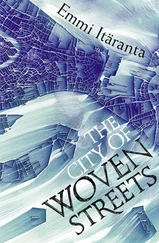I imagined the room filled with a soft wrap of water that slowed down all movements and muffled all sounds, washed me clean inside and out, made everything fade and crumble.
My father’s face made of water-soaked wood, Niiramo’s shape of stone dissolving into sand. My own body an undulating stalk of seaweed in the waves moving back and forth. All this already out of my reach, something I couldn’t stop and forestall even if I tried.
I let them drift away.
Slowly, like the moon gathers and turns the tides, my muscles relaxed, the tightness withdrew from my face and my breathing flowed more freely. The tenseness was still there, but it was at a distance now, no longer armour on my skin, locking me down.
The room simmered with the heat radiating from the hearth and the steam rising from the cauldron. The air was completely still. My hairline was moist and I felt the fabric of the graduation outfit sticking to my armpits and thighs. Sweat glistened in beads on Niiramo’s brow. My father’s face was flushed. I had left the small window on the entrance wall open before the beginning of the ceremony, but the fresh air outside seemed to have packed itself into a block against the opening, not knowing how to stream in. I got up from my cushion and opened the slightly larger window on the opposite wall. Even though the day was calm, draught blew in immediately and the air began to flow through the room again.
Niiramo placed his cup down and looked at me.
‘Miss Kaitio, are you sure that both windows need to be open?’
From the corner of my eye I saw my father stirring restlessly.
‘It is much more pleasant in the room with some fresh air, don’t you think?’ I replied.
‘Noria, Master Niiramo expressed his wish that the window should be closed,’ my father remarked. The shadow crossing his face had shifted slightly. It fell over his bare neck now.
Niiramo stared at me, and I wasn’t sure if I should interpret his expression as a smile.
‘Miss Kaitio can do as she sees best,’ he said.
I left the window open, bowed to Niiramo and took my place next to the hearth again. Niiramo said nothing more, but I was now certain of the smile: the kind that a rich merchant smiles when he catches a messenger boy stealing goods. The dark mood didn’t pass from my father’s face during the meal, and it seemed to me he was stealing secret glances at Master Niiramo.
I waited until they had finished eating and collected the plates. I took them into the water room, removed a linen cloth from the top of a bowl of sweets and brought the sweets into the main room. I served yet another round of tea with them.
There was no more water in the cauldron.
I knew it was time for the evaluation.
‘Noria Kaitio,’ Niiramo said and bowed. ‘Take your place, please.’
I bowed in response, walked into the water room and pulled the sliding door closed after myself.
The room had no windows. It was used for storing water, trays, ladles, cauldrons and teapots. If I reached my hand in any direction, it would meet the wall, or some of the tea utensils. Hair-narrow strands of light framed the sliding door and the tea master’s entrance on the opposite wall. Inside a blaze lantern hanging from the ceiling, blazeflies were flittering languidly against the confines of their glass prison. Shadows hovered on the walls, opening and closing like floating nets, curling closer and withdrawing again. I heard Niiramo and my father talking in low voices.
I thought of my mother again, her journey that could have been mine: another life in which I had buried my tea master’s outfit instead of accepting it as my second skin. Bright as a reflection in a clear mirror, I saw myself, walking and learning the scent and twists of the unfamiliar streets between the buildings of a strange city like one learns a new language. And beyond that, a landscape of my own, for me to discover and make my home.
I heard some shuffling from the tearoom, then footsteps on the veranda outside, and then a soft noise as the sliding door of the visitors’ entrance was pushed closed. I could guess either Niiramo or my father – or both of them – had gone to get something from the veranda.
The city and the landscape shrivelled away. There was only darkness at the bottom of the mirror, and no other life but this.
A soft ring of a bell sounded from the tearoom. It was time for me to enter again. I swept the hair from my face and opened the sliding door. I had been right: at least one of them had gone to the veranda. Niiramo was holding a scroll, and my father had a thick, leather-bound book in his hands.
‘Noria Kaitio,’ Niiramo said.
I bowed.
‘As the evaluating tea master, I must point out the mistakes you made while performing the ceremony.’ He was quiet. I waited. The softening veil of water had withdrawn from the room, there was only a dry and stony desert, a sphere of burnt air I could barely breathe. ‘It is clear you know the etiquette of the ceremony well,’ Niiramo continued. ‘But it is equally clear that you deliberately change it according to your own will where change is not advisable.’ He looked at my father and smiled his rich merchant’s smile.
‘I presume you know the rule by which only one of the teahouse windows must ever be open during the ceremony?’
‘Yes, Master Niiramo, I am familiar with the rule.’
‘Would you care to remind us why it exists?’
I quoted exactly as I had been taught.
‘So the guests could take pleasure in the scent of the tea and the humidity of air created by the water. Draught in the teahouse drives the aroma and the humidity away.’
‘I would be curious to hear why you took the liberty of breaking this rule.’
I bowed again, although I felt annoyed at having to answer such a stupid question.
‘For practical reasons, Master. The heat in the teahouse was suffocating. As the host, I thought of the comfort of my guests.’
Niiramo scrutinised me. I didn’t avert my gaze.
‘Whatever your reason, it was still an exception to the form and as such, a mistake,’ he said.
I forced myself to remain quiet. Niiramo continued, ‘Another mistake, on which I’m sure your father agrees with me, was your choice of teaware.’
I thought of the teacups and plates, their surfaces cracked by change and time, their steady forms under my hands, connecting me to the past-world.
‘Why do you consider it a mistake?’ I asked.
Niiramo’s smile twitched and deepened in his fleshy, smooth face. I thought of a narrow, long maggot digging into a rotten piece of fruit.
‘You must realise that a tea master preparing for such an occasion should choose the most valuable teaware available. It demonstrates respect towards the guests and understanding of the privileged nature of the tea master’s profession. I happen to know,’ at this point he gave my father a look, ‘that your father enjoys Major Bolin’s favour, and I can see from your house and garden that you have some wealth. I’m convinced you own better teaware, and you could surely have had a whole new tea set made for the occasion. That would have been wisest.’
‘But Master Niiramo—’ Niiramo’s eyebrows rose higher on his sweaty forehead when I spoke without permission. My father looked horrified. I cut myself short and bowed in order to request permission to speak, as was part of the hierarchy between master and apprentice. Niiramo nodded.
‘Master Niiramo, the ceremony is not about showing one’s wealth, but embracing change and accepting the fleeting quality of the world around us. It was my intention to honour this.’
Niiramo’s smile didn’t disappear. A sweat drop trickled down his cheek towards the skilfully crafted collar.
‘Are you telling me , girl , what the tea ceremony is about?’
Читать дальше
Конец ознакомительного отрывка
Купить книгу












